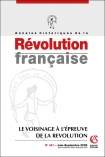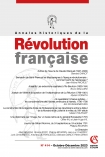
Histoire, Economie et Société (3/2020)
Pour acheter ce numéro, contactez-nous
Recevez les numéros de l'année en cours et accédez à l'intégralité des articles en ligne.
Les petites annonces de quatrième page sont, dès le dernier tiers du XIXe siècle, investies par les questions intimes. Mariage, sexualité, sentimentalité ou hygiène, font autant l’objet d’offres que de demandes. L’article cherche à analyser les ressorts de cette marchandisation de l’amour qui traduit une difficile rencontre entre le marché et la morale. La presse entretient en effet une relation ambiguë avec ce type d’annonces —entre pragmatisme opportuniste et tentatives de contrôle. Ces annonces permettent d’appréhender l’histoire des sexualités et du couple par le biais de la publicisation, car elles supposent une expression de soi dans laquelle, le privé épouse la loi du public.
In the last decades of the nineteenth century, intimate affairs flooded into the expanding classified pages of the mass press. Marriage, sexuality, romance, pornography, and hygienic services and goods were offered or requested in long columns of text-based ads. This article analyzes the motivations and mechanics of this much-contested commodification of the intimate, marked by the uneasy meeting of market and morality. Indeed, the relationship between the press and the ads that appeared in its pages was an ambiguous one in which opportunistic pragmatism and efforts at moral control coexisted. The study of these « intimate » ads reveals the emergence of forms of self-expression in which the publicly unspeakable became speakable as advertisers communicate about private matters while abiding by the rules of public engagement.

